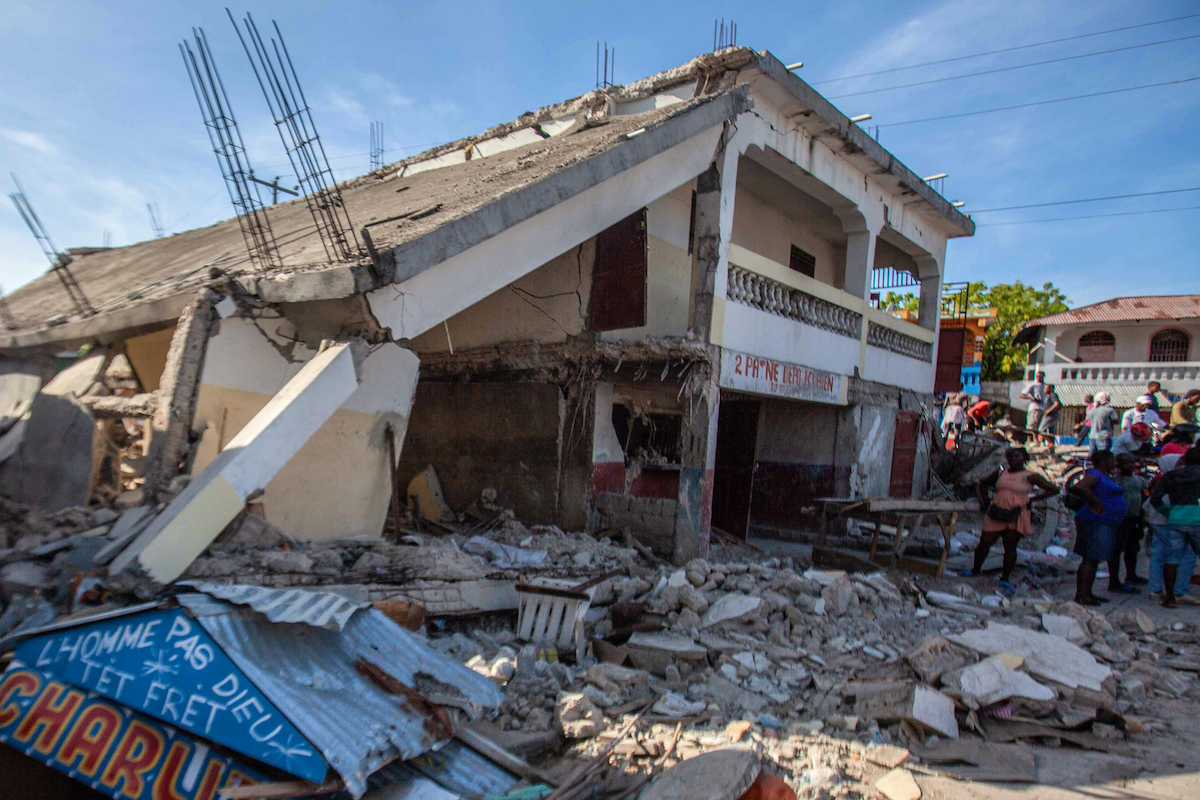How To Help Haiti Following This Weekend’s Devastating Earthquake


A 7.2-magnitude earthquake hit Haiti on Saturday, killing approximately 1300 people, destroying more than 13,000 homes, and damaging another 13,000. Making things even worse, the entire coast of Haiti is under a storm watch as Tropical Depression Grace threatens to hit the country with high winds, flash flooding, mudslides, and more destruction. The storm watch is in effect through Tuesday.
Haiti is still recovering from the 2010 earthquake that left the country devastated. Hundreds of thousands of people died in that quake and hundreds of thousands more were left homeless.
Following the 2010 earthquake, there was an outpouring of donations from overseas, with the Red Cross raising almost half a billion dollars. However, in the years following, much of that money appeared to go missing.
“The American Red Cross vowed to help Haitians rebuild, but after five years the Red Cross’ legacy in Haiti is not new roads, or schools, or hundreds of new homes. It’s difficult to know where all the money went,” reads an NPR report from 2015:
The Red Cross says it has provided homes to more than 130,000 people, but the number of permanent homes the charity has built is six.
The Red Cross long has been known for providing emergency disaster relief — food, blankets and shelter to people in need. And after the earthquake, it did that work in Haiti, too. But the Red Cross has very little experience in the difficult work of rebuilding in a developing country.
If you’re looking for ways to help the people of Haiti following this weekend’s devastating earthquake, the consensus from those with knowledge of the area is that the Red Cross is still not the way to do that. The best thing you can do is take a little time to research an organization before donating, as well as to be patient in your desire to help.
A lot of big orgs have one-click or text-to-donate services available, but many local, on-the-ground resources are scrambling right now. I know a lot of us have the urge to donate right this second but a little patience (and a commitment not to forget about the devastation in Haiti when headlines inevitably move on) can go a long way to offer more direct help.
quick update and a reminder:
it’s only been a few hours since the earthquake struck, most communications are down in the region & those in the affected areas are mid-emergency.
One of the best things people outside Haiti can do is be patient in our support.
— ashley yates (@brownblaze) August 14, 2021
As organizer and community advocate Ashley Yates says in that thread, “direct aid is the best aid.” If you don’t know anyone in Haiti, there are a number of GoFundMe campaigns popping up, aimed at helping people and communities even entire villages in the country. (Given the nature of crowdfunding sites, it’s a good idea to look into a campaign before donating if you don’t know anyone personally involved. But they can be a great way to offer immediate aid to those in need.)
If you can support someone in the region or their family directly, I deeply encourage you to do that.
I’ll share links to some organizations that are positioned to support in response with trusted records for those without direct ties. 🖤✊🏾🇭🇹
— ashley yates (@brownblaze) August 14, 2021
Here are some other resources, and we’ll be updating this list as needed:
CNN’s “Impact Your World” and Public Good have compiled a list of organizations you can donate to individually or all at once with one donation.
CORE (Community Organized Relief Effort) has a good reputation and has an easy, fast donation process:
.@coreresponse is mobilizing to give urgent care for the thousands of Haitians devastated by yesterday’s earthquake and raising funds to provide emergency shelter, medical care, and rubble removal is of critical importance. You can help by donating athttps://t.co/l8phR6TfKW
— Conan O’Brien (@ConanOBrien) August 16, 2021
Within hours of the 7.2 magnitude earthquake on Saturday, CORE’s Haitian-led team deployed to the hardest hit areas to provide urgent medical relief, emergency shelter, and essential supplies. pic.twitter.com/idvRyHBxJX
— CORE (@CoreResponse) August 16, 2021
Partners in Health is another global relief organization with a good rep, and you can also donate directly to their Haitian sister NGO, Zanmi Lasante.
A 7.2 earthquake in Haiti has killed 1,300 and injured 5,700 more. If you want to help and don’t know where to start, I urge you to donate to @ZanmiLasanteht (Haitian sister org of Partners in Health) who are providing immediate relief on the ground: https://t.co/c21huFhVsQ 🇭🇹 pic.twitter.com/My9rDkz3fT
— Alice X. Zhang (@alicexz) August 16, 2021
If you know of other places to donate or send other forms of aid, please share in the comments.
(image: Richard Pierrin/Getty Images)
Want more stories like this? Become a subscriber and support the site!
—The Mary Sue has a strict comment policy that forbids, but is not limited to, personal insults toward anyone, hate speech, and trolling.—
Have a tip we should know? [email protected]
